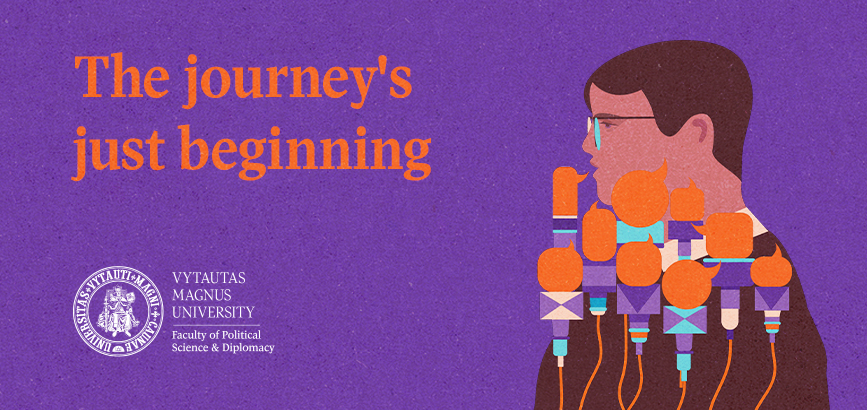Thanks to the Graduate Scholarship – Internship in Tallinn
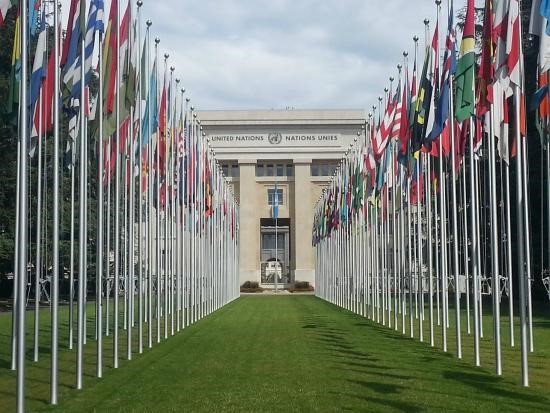
This summer proved to be exceptionally busy for a third-year Bachelor’s degree student of “Political Sciences” Manvydas Džiaugys. The student is doing an internship in the Lithuanian embassy in Tallinn. Estonia is the president of the Council of the EU from 1st of July 2017 till 31st of December. Due to this, Tallinn, next to Brussels, is the place where European Union politics are currently being formed and possible scenarios for the future of the community are being discussed at a highest political level. Manvydas is extremely happy, since the internship at the diplomatic embassy provides with a wide range of useful experiences, and requires to partake in different activities, such as: observing the informational field, public event organizing, administrating the embassy’s social media, observing counseling activities, and working with the Lithuanian community.
The interesting thing is, that Vytautas Magnus University, political science graduates helped to organize this internship. This is the third time that they support students by providing them with a Graduate Scholarship. They sponsor Political science and Diplomacy faculty, Bachelor’s or Master’s degree students, who go to do an internship in a country that is currently the president of the Council of the EU.
Head of the department of Political science, Andrejus Pukšto, emphasizes: “I’m glad that we are able to provide our students with not only state, but also private patron established scholarships for internships. The Graduate Scholarship speaks volumes, and shows the close bond that the university has with its alumni.”
Right away, at the beginning of September, the contest for Stasys Lozoraitis scholarship will be announced. This scholarship is meant for “Diplomacy and International Relations” second-cycle students, to do an internship in Rome.
VMU student G.Čepulytė awarded by Sakartvelo institutions for UN model simulation
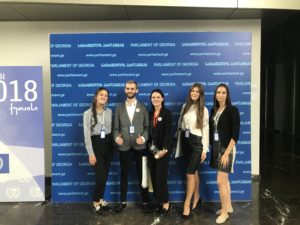
On the 12-16th of September, 2018, in Kutaisi city, Sakartvelo it was organized the international UN model simulation. Model UN simulations are usually meant to expand the views of the students, to help them better understand the daily work of the United Nations and attain practical skills in negotiations and decision-making. These events are mostly organized and run by students.
The faculty of Political science and diplomacy of Vytautas Magnus University was represented by Gertrūda Čepulytė, Artūras Matusevičius, Evelina Batakytė, Sandra Kudzmaitė, Vaineta Kazlauskaitė and Ieva Jakubavičiūtė.
This event, UN model simulation in Kutaisi, attracted students from 11 different countries, who took the tasks and participated in the simulation while representing different assigned countries- UN member states. The best participants of the Model UN were rewarded in different categories: Best public speaker, Best Delegation, Best position paper.
Gertrūda Čepulytė received an award ( first place) for the public speech in the category “best public speaker” while representing the position of the Republic of Yemen. Gertrūda was also awarded with gifts from the Kutaisi City Hall, Peace Corps, and LDA Georgia organisations.
Congratulations!
Studentės įspūdžiai atliekant Lozoraičių fondo remiamą stažuotę Romoje

PMDF Diplomatijos ir tarptautinių santykių magistrantė Emilija Giedraitytė dalinasi savo įspūdžiais:
“Esu labai dėkinga Politikos mokslų ir diplomatijos fakultetui ir visiems, kurių dėka man teko garbė atstovauti Vytauto Didžiojo universitetą Italijoje, LR ambasadoje. Antrą savaitę esu ambasados kolektyvo dalimi, atlieku man pavestas įvairias tiek administracines, tiek analitines, politines užduotis. Artėjant svarbiausiai 2018-ųjų metų sukakčiai Lietuvoje – Valstybės atkūrimo šimtmečiui – turėjau galimybę prisidėti prie kultūrinių renginių viešinimo, organizavimo Italijoje. Man didelė garbė, kad ambasadorius ir kiti diplomatai pasitiki manimi ir leidžia padėti. Ambasada yra puiki vieta praktiškai pritaikyti tiek paskaitose, tiek kitų stažuočių metu įgytas žinias ir įgūdžius. Mokytis iš savo srities profesionalų taip pat yra geriausias būdas pažinti darbo specifiką, diplomatinio bendravimo niuansus.
Nuo vaikystės, Lozoraičių vardas man siejosi su garbingu valstybės atstovavimu, diplomatija aukščiausiame lygmenyje, nepriklausomybės dvasia, elitu, kilnumu. Nuo šiol ir aš esu nedidelė šios sąsajos dalis. Man tai reiškia ne tik garbę, bet ir atsakomybę toliau oriai reprezentuoti valstybę ir universitetą, kad ir kur bebūčiau, skleisti „vilties prezidento“ keltas idėjas ir viešinti šią pavardę Lietuvoje ir užsienio šalyse”.
Why VMU: It’s Like Studying in the United Nations
An intern from Hong Kong currently working at VMU interviewed a number of international full-time students and asked them to explain the reasons for choosing studies at Vytautas Magnus University. This series of articles, “Why VMU?”, presents their thoughts.
Mohammad Noman is a second-year student of World Politics and Economics at VMU. He explains that he applied for this programme because of positive feedback he heard about the VMU Dept. of Political Science. “VMU is in a country which is a member of the European Union, it is famous for its political field and provides the best education for students. It is especially good for students coming from the Middle East. My friend highly recommended it to me”, Mohammad, who hails from Afghanistan, says.
Mohammad is grateful for the international atmosphere of the university. According to him, this experience is “like studying in the United Nations”: VMU welcomes lots of students from different countries. He enjoyed meeting new people who come from different cultural backgrounds and speak different languages.
Due to all the international friends that he has, Mohammad can now speak simple words, such as “hello” and “thank you”, in multiple languages. He is appreciative of the vast amount of exchange programs available at VMU and says he is definitely planning to apply for one of them in the future.
Aside from the international atmosphere, Mohammad also likes the university’s teachers and lecturers. “The professors here do not just read out the notes in the classes and leave. They care about the learning experiences of the students. Students need to do lots of preparation, such as reading and writing before classes”, the student says. Mohammad believes this could help the students to be more hardworking and deepen their understanding of the studies.
While he is majoring in political science, Mohammad is also very eager to learn knowledge of other fields as well. He is highly thankful to VMU for its focus on liberal arts, which means an orientation towards a diverse, wide range of knowledge for each student. “We can learn general knowledge about different issues. This helps the students to become broad-minded and critical individuals”, Mohammad explains.
The sophomore student dreams to not only provide a comfortable life for his family, but also to create a happy and peaceful life for people in general. He would like to be the man of the people and work to change the society. The Afghan native is grateful that the education provided by VMU gave him the chance to acquire different pieces of knowledge and to also change his mindset, which will help him to become a better person and achieve his dream in the future. He highly appreciates the impact of education of VMU.
VMU Invites International Students to Become Mentors
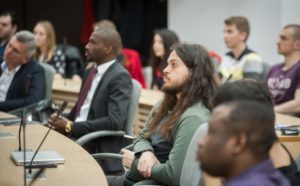
VMU International Cooperation Department invites full time VMU students to join the Mentors’ programme and become a mentor for the new incoming international students.
VMU Mentors’ programme aims to facilitate the adaptation process of incoming international students at VMU, promotes volunteering and increases international experience of the university’s students.
VMU international full time students willing to join the Mentor‘s Program have to fill in the online application formuntil May 10.
Selection Process of VMU Mentors:
- VMU students selected according to their applications will be informed personally on May 10 and will be invited to the motivational interview on May 11-12.
- After the interviews selected candidates will be informed personally and invited to the first meeting.
More information
VMU International Cooperation Department
Orinta Movsesjan
E-mail: Orinta.Movsesjan@vdu.lt
S. Tavelishvili: the friendliest university in the world
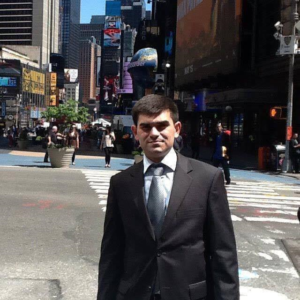 Saba Tavelishvili, second year student of Master programme in International Relations and Diplomacy from Georgia, talks about his experience at Vytautas Magnus University.
Saba Tavelishvili, second year student of Master programme in International Relations and Diplomacy from Georgia, talks about his experience at Vytautas Magnus University.
Why did you choose your study course and in WMU? Was it just lucky choice or dream that you worked for?
Well, talking about the university it’s always hard to choose as there is lots of options. However, after I’ve received the letter of acceptance I was so happy that I didn’t wait for answers from other universities and started to prepare for new challenges and experiences in Lithuania
You are studying your last year, maybe you could explain what VMU and your academic program gave to you and your personality?
First of all, I should underline the role of my university that I became more interested in academic life, I mean working on papers, articles and trying to present my works on several international or local conferences. Talking about personality I would say that I developed the sense of self-awareness as my study program is highly qualified and the professionalism of academic staff is on a high level.
What did you mostly like about VMU? Could you give our universities pluses?
About the pluses of VMU I can talk continuously, starting from friendly students and the soul of university which is so cozy that it never will leave you. But I would like to separate the internationalism of the university, lots of foreigners are coming to this university which is developing so called networking and exploring lots of cultures which is the most important thing in your life and even in our carrier.
During your studies did you participate in various university clubs or activities? What these clubs gave to you? Could you recommend something to your younger colleagues?
Well, clubs and activities is the most important part of the studies. Theoretical part can be taught from books lectures and so on, however clubs, conferences and other activities are giving a chance practically implement your knowledge, develop it and adopt yourself for future carrier, as in such activities student can find the main direction of his/her carrier. My recommendation to young generation would be to take the part in such activities as much as possible, to develop their skills of leadership, find what they want and what they like, and be to be sure that they are doing this because they really want and not just because that we need a legal paper to proof our knowledge.
Have you participated in Erasmus+ programs? If yes, was it worth the time? What experience did you receive? What differences you could tell between Lithuania studies qualities and other countries?
Erasmus+ program is one of the interesting and funniest time during the studies. First of all, you are changing a place and moving to another country and exploring it, secondly you can compare the quality of studies between the home and host universities, and in this competition always home university is winning because we are “patriots” of our university. And lastly your area of people is increasing and you are becoming the part of Erasmus family which will last during of our life.
What are your plans for the future? Do you want to work according to your specialty?
I’ve chosen IR studies because I’m really interested in this field, and my aim is to synchronize my work and specialty in the future. All my plans are connected to stay in this field, and for sure I will do PHD after I will gather an experience from the work.
Could you give some advice to those who are going to study in VMU political science faculty?
Be motivated, study hard, work hard and be friendly because VMU is the friendliest university in the world.
What are you studying?
International Relations and Diplomacy.
Interview prepared by Lukas Fabijonavičius
Interview with a student of our Faculty
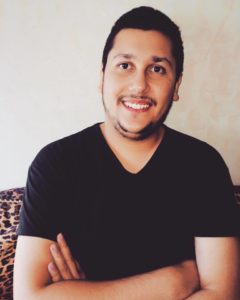 Interview with Mohamed Zakaria Belmehdi, a student of Bachelor study programme International Politics and Development, about his political science studies at Vytautas Magnus University. M. Z. Belmehdi is VMU Ambassador from Marocco.
Interview with Mohamed Zakaria Belmehdi, a student of Bachelor study programme International Politics and Development, about his political science studies at Vytautas Magnus University. M. Z. Belmehdi is VMU Ambassador from Marocco.
Why did you choose to study in International Politics and Development study field and why from all other universities did you choose to study at Vytautas Magnus University?
For me I’m attracted to political science, the subjects of the program attracted me as well as the description about individual subjects and the program. Before coming to Vytautas Magnus University I’m was searching about a suitable political science program in English language, plus Lithuania attracted me the most.
Since you are studying in your last semester, could you please describe what experience have you received from VMU International Politics and Development studies?
Studying in VMU International Politics and Development Studies, have deepen my knowledge about political science in general and also about politics in some other regions of the world, I would say that now I’m more knowledgeable in the field than when I came in my first year, although I still need to do more efforts.
What did you like the most in VMU? Could you please describe VMU’s advantages and disadvantages?
It’s very hard to say one thing exactly, I’m satisfied 99% with my studies and the university. I like most of the subjects, most of the professors, the education system, the events and activities.
VMU advantages: high quality of education, flexible and decentralized system of education, a lot of students activities and events, international environment in both teaching staff and students, friendliness within the teaching and administrative staff and of course students, modern and rich library.
VMU disadvantages: I guess the A and B groups system should be reformed or abolished, and also we should learn from the first year how to write academic paper properly.
Had you any additional activities while studying? Did you participate in university clubs or organisations; other organizations? What did you gain from these activities? In case you did not participate, please clarify why? What could you recommend for younger colleagues?
Of course, I would describe myself as the most active international student in VMU, I was taking part in almost every event organised by ESN, and later on I join them, I took part in events of other organisations such as APK, Asians clubs, etc…
It was useful for me especially clubs that are oriented toward politics I learned a lot and had chance to express myself. In others I had fun, and in others I learned about other cultures, also sometimes you meet some wonderful people.
However unfortunately, there are three main challenges, some organisations are not open to foreign students, others are totalitarian organisations and they don’t accept the others opinion and also I don’t know what is wrong with recent international students but many of them are not interested in taking part in extracurricular activities.
For younger colleagues, I would suggest them to be more active, to be ambassadors of their cultures. Many students want to know about others cultures.
Have you participated in Erasmus + or bilateral exchange programmes? If yes, was it beneficial? What experience have you gained? Have the studies in foreign countries any differences? If no, why did you not you embrace the opportunity?
Unfortunately, I never been as an Erasmus student, for personal reasons as well as the fact that the third and fourth year of studies are very interesting to be missed, on the other hand I took part in Erasmus Internship in Plzeň (Czech Republic), and it was interesting to learn about another country culture and see how is it life there.
What are your plans and dreams for the near future? Do you plan to link your future with your study programme?
I would like to continue my master studies, and in this case I’ll jump directly to the next question.
Do you plan to study Master degree? If yes, what programme do you plan to study?
Yes, I would like to study International Relations and Diplomacy master in VDU, however I wish if a new program of political science will be open, preferably something about Eastern Europe politics.
What could you wish for students who dream/plan to study in VMU Faculty of Political science and Diplomacy?
I would simply say, if you want to study in a high quality education, in an international environment, and having fun, then VMU is the right place for you, and of course the student should be interested and love political science, then PMDF is the right place.
In which study programme do you study?
4th year International Politics and Development Studies.
Interview prepared by Jūratė Vietaitė
Olivia Wells: VMU is Destined for Great Things
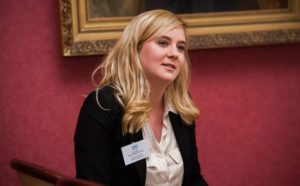 Seeking to increase student awareness and participation in political life, to nurture tolerance and human rights and to analyze global problems, the United Nations Student Club was founded several years ago at Vytautas Magnus University in Kaunas, Lithuania, eventually evolving into the Lithuanian United Nations Youth Association, LUNYA. This summer the association was recognized as an official member of the World Federation of United Nations Associations (WFUNA) and was invited to implement joint projects with Columbia University in New York, USA.
Seeking to increase student awareness and participation in political life, to nurture tolerance and human rights and to analyze global problems, the United Nations Student Club was founded several years ago at Vytautas Magnus University in Kaunas, Lithuania, eventually evolving into the Lithuanian United Nations Youth Association, LUNYA. This summer the association was recognized as an official member of the World Federation of United Nations Associations (WFUNA) and was invited to implement joint projects with Columbia University in New York, USA.
The head of LUNYA, Olivia Wells, is an American VMU student. She shared some of her impressions about the studies in Lithuania and Europe and discussed the youth association’s projects.
Why did you choose to study at VMU?
Majoring in Classics at University of Southern California brought me to Athens, Greece, where I spent a year studying abroad. I fell in love with Greece and Europe in general and decided that I wanted to continue my studies in Europe. While in Greece, I had made the decision to change my focus to international relations and human rights and felt that I would get more out of studying in Europe than in America. Additionally, even with scholarships, studying in the U.S. is ridiculously expensive and was becoming more and more difficult for me to afford. I also thought it would be unique to study international relations in a part of the world that I knew very little about – we don’t learn much about Eastern Europe in the U.S. (except as a monolithic bloc with historical ties to Russia).
What do you think about the quality of studies at VMU, the community etc.?
VMU really surprised me. Coming from a big school like University of Southern California, it’s nice to be in a smaller environment where students can develop meaningful relationships with teachers and the administration. Any place where you live or study is what you make of it. So, if you are an active student, VMU is a great school because the professors and administration are more than willing to work with you to help your projects come to life. There are a handful of really great professors that are already teaching there. My program at the Faculty of Political Sciences and Diplomacy is very new and it still has some kinks to work out. But the administration is very open to working with the students to find out what those kinks are and search for solutions.
Additionally, as Kaunas becomes more and more international, the opportunity to host international events with other universities and students from all over the world increases. Though they both still have some growing pains to go through, I think the city and the university are potentially destined for great things.
How did you decide to found the Lithuanian United Nations Youth Association (LUNYA)? Is this your project?
Actually, LUNYA evolved out of the United Nations Students Club (UNSC), which was an organization that I became involved with shortly after its founding. When I joined the club, there were a lot of internal problems and disagreements among its members, which meant it was not functioning properly. When I was voted in as the new president a few months later, we revamped the club and began actively pursuing new members and new projects, establishing ourselves as a successful student organization (and one of the most active on campus). VMU took notice of our enthusiasm and outreach and decided to work with us to take the club one step further – thus began our cooperation with the United Nations and our transformation into the association we are today.
Why do you think this organization in VMU is so important for Lithuania? And why is LUNYA important in Europe?
Through LUNYA we hope to put Lithuania on the map of youth organized EU-wide events. There are not many youth organizations in Lithuania hosting or attending large-scale EU events. There are also not many large-scale youth organized events taking place in Lithuania. We hope to fill this gap by developing and promoting EU-wide events (such as transnational Model UNs, Youth Forums, and various other symposiums) that would be hosted here and sending students from Lithuania (international and Lithuanian) to represent this country in events throughout Europe.
Is LUNYA an official member of the World Federation of United Nations Associations (WFUNA)?
Yes. As of July 2016, LUNYA is an official member of the WFUNA – representing the youth wing of the United Nations Lithuanian Association. I had a meeting at the United Nations with the youth program officer of WFUNA to finalize the agreement and talk about future projects. On our page on WFUNA’s website, you can read about our current projects, our strengths as an organization, and our potential future projects – one of which is organizing an annual Baltic Model UN, which we are hoping to implement in spring 2017.
When you were in Lithuania and participated in various debates and conferences, in your opinion, what problems are important to Lithuanian youth?
Lithuanian youth tend to be most concerned with political issues having to do with Russia, Eastern Europe, regional security, etc. Given Lithuania’s geopolitical history, these concerns make sense. And while LUNYA has hosted several events focused on these topics (and will continue doing so), we also believe it’s important to talk about other pressing issues occurring in Europe and around the world – in an effort to promote understanding and tolerance.
One thing we have noticed is that the majority of students that attend our events are international students. Lithuanian students seem more reluctant to spend time attending extracurricular events, unless they are receiving class credit for their participation. We are currently brainstorming how to get more Lithuanian students involved in our projects.
Can you tell us more about future joint activities between LUNYA and Columbia University in New York? How can VMU professors and students participate in this project?
The Editor and Programs Director at the Council for European Studies (CES), Katrine Øgaard Jensen, reached out to me recently to discuss collaboration with LUNYA. CES is the leading international organization for the study of Europe and works in conjunction with Columbia University. Katrine was familiar with our work and asked if we would be interested in collaborating with CES on a new project. CES is planning on publishing a blog and they want LUNYA and VMU to be the primary contributors to it. It’s a great way for students and professors at VMU to have their work published by a well-known and highly regarded. We have not finalized the collaboration yet, but are very excited about the future prospects.
In your opinion, how can VMU contribute to global education and sustainable development?
VMU can contribute by continuing to work with student organizations to host events that raise awareness of these issues. I think these events are the key to engendering a culture of tolerance and understanding among Lithuanian youth. One thing I would like to see is sending students to more international events that have to do with global education, sustainable development, and human rights. The benefit of VMU students attending these events is two-fold: the students would gain indispensable knowledge that they could then impart on their fellow students upon their return and the students can act as ambassadors to promote Lithuania and VMU abroad.
What about your future plans, will you return to Lithuania? Will you continue LUNYA projects and activities?
I will continue working on LUNYA projects until the end of this academic year when I graduate in the spring, at which point I imagine I will still be involved with the organization remotely. I am working closely with Lithuanian correspondents at the UN to continue expanding and building on LUNYA’s past work, and I hope by the time I leave the organization we will be established well enough for the next president to take over easily.
As for my future plans – I will be working with the U.S. Embassy in Athens, Greece this spring and the refugee/immigrant NGO, Praksis, while writing my bachelor’s thesis. I hope to then work as a Fulbright scholar for the 2017/2018 academic year, after which I will pursue my master’s degree in Europe. Even though I will most likely not pursue a master’s degree in Lithuania, I plan on retaining my ties to the country for many years to come.
Fulbright Experience
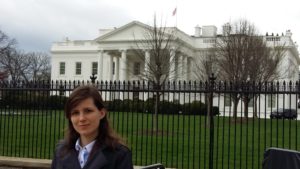 First of all, it is completely impossible to describe my Fulbright experience in few pages or in hundreds of pages. The reason is simple. Imagine that you have never tasted chocolate. You can read a bunch of books about chocolate, know the recipe and the smell of it, write a dissertation about it, but if you have never tried it, you will never know what actually chocolate is. Thus, even though I will try to do my best in these pages, I do not have enough words to explain it to anyone.
First of all, it is completely impossible to describe my Fulbright experience in few pages or in hundreds of pages. The reason is simple. Imagine that you have never tasted chocolate. You can read a bunch of books about chocolate, know the recipe and the smell of it, write a dissertation about it, but if you have never tried it, you will never know what actually chocolate is. Thus, even though I will try to do my best in these pages, I do not have enough words to explain it to anyone.
The most important reason why I have applied for the Fulbright, of course, was my research. This experience exceeded my expectations. I have done a lot of interviews (for the record and off the record, formal and informal) with think tank experts and governmental officials (the Carnegie Endowment for International Peace, the Brookings Institution, the Department of State, to name a few). However, the most memorable interview for me was with an expert from the Washington Institute for Near East Policy. We had to reschedule our meeting for 4 times. I have to admit I was upset about that. One time I was already close to the Institute when I received a message from his assistant that we have to reschedule. Again! It was more than an hour distance for me to go to the Institute with an awfully slow Washington’s public transport. I thought that this man was probably very arrogant or something and, at the same time, I was justifying him: “Well, he worked with Madeleine Albright and John Kerry, so he probably has a right to be arrogant.” But when I actually have met him, it was a good lesson for me. He was so humble, he apologized to me like dozens of times for the rescheduling and gave me sincere, smart answers to the interview questions. I felt incredibly inspired on that day and embarrassed that I was thinking like that about this intelligent man.
Another interesting experience for me was the bond that I have made with my host university, American University (AU) and, especially, School of International Service (SIS). I was introduced with hard-working and talented doctoral students by my advisor Prof. Boaz Atzili. He was so kind while helping with my project and now our academic relationship continues. One of the memorable meetings at AU was the first consultation with Prof. Patrick Thaddeus Jackson, who is also an Associate Dean in SIS. While I was waiting for a meeting with the professor, I saw the quote on the wall: “It is a mark of an educated mind to be able to entertain a thought without accepting it” Aristotle. I thought to myself that it could be any university’s primarily goal. After an hour of talk with the professor my first thought while walking out of his office was: “Oh my, this man knows how to entertain a thought.” He is a fabulous, creative and sharp-minded academician. I was privileged to attend doctoral seminars of Advanced International Theory that was taught by him and Prof. Ann Tickner. This class expanded my knowledge on theory. I have started raising questions that I have never even thought about. Those questions I have also discussed with another extraordinary professor, Associate Dean Rosemary Shinko, who is a well-known theorist in International Relations field who gave a lot of advice for my research.
Working on my dissertation for hours in the library was also a part of the experience. Maybe not the most fun part but, still, a very important one. The vision of my dissertation has changed, including the title which now is „The Nexus between Knowledge and Action in the U.S. Foreign Policy: the Role of Think Tanks in the Construction of “the Middle East”. Many new ideas floated into my dissertation after hours of work.
Another thing that I have to discuss is, of course, a very important mission of every Fulbrighter which is being an informal ambassador of your country. Spreading the knowledge about Lithuania was sometimes not planned in advance. Talking with strangers actually was a big part of it. Everyone knows, that academicians and doctoral students or master students are already knowledgeable people. Most of the time they know at least geographical location of Lithuania. On the other hand, people that start to talk with you on the bus, in the coffee shop or gym are not always that well introduced with World’s geography and cultures. I will give you an example. I was attending a gym close to my home and most of the time I was wearing Lithuania’s national basketball team’s T-Shirt. On purpose. It was actually my roommate’s advice who thought that it would be a good way to spread the knowledge about Lithuania. So, it was a number of people who asked me about the T-shirt and that is how they were introduced to Lithuania and its people. On the flip side, I was surprised several times about people’s knowledge on Lithuania. For instance, I have met an Alumni from AU who is from China and he is learning…Lithuanian! Another person that I have met on the metro was asking me about the political situation in Lithuania and what is the state of Lithuania’s democracy. Being an informal diplomat of Lithuania was a fun and rewarding experience. Other experiences like volunteer day with other Fulbrighters, having a coffee with them seemed like a natural part of it but talking with Americans and people from around the Globe who were curious about Lithuania was a very pleasant surprise for me. There were more surprises that are very precious and personal to me like going to the concert where the guitarist played who inspired me to play the guitar few years ago. After the concert I was not able to sleep all night because of the excitement. Those moments probably I will remember till the last day of my life.
In my personal statement while applying for this program I wrote that everything started because of the TV series the West Wing. While visiting memorials and having a tour in the White House and recognizing all the places that I have seen in this show, I was reflecting about how much I have changed since then. The Fulbright experience was like living in my teenage dream. So, here I am (What is that song?… “Here I am, this is me. There’s nowhere else on Earth I’d rather be…”): a girl who had nothing as a kid (sometimes even what to eat) is walking in the White House, shaking hands with people who contributed to the world’s history like Zbigniew Brzezinski or some others that I have seen in various think tank events. I wish that everyone could feel this sense of achievement.
In some regards, it was a challenging academic year. It was hard physically (I was super skinny and tired most of time) and psychologically, when I was missing home and my loved ones so bad that I wanted to buy tickets back to Lithuania. However, this sketch of my Fulbright experience demonstrates that this program is an opportunity to find your strengths that you have never noticed while being in your comfort zone. I encourage you to apply and share your Fulbright experience because, I bet, it will be different but still the one of the best adventures in your life.
More information about the Fulbright Program you will find in the website of Embassy of the United States of Lithuania: http://vilnius.usembassy.gov/resources/educational-exchanges2/fulbright-program2.html
For other countries’ citizens check out a website of the U.S. Embassy in your country.
Danguole Bardauskaite
Fulbright Program Alumni, American University, School of International Service
PhD Candidate at Vytautas Magnus University, Faculty of Political Science and Diplomacy




